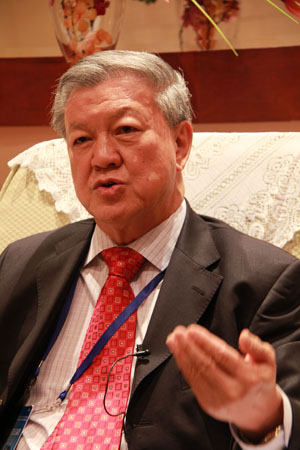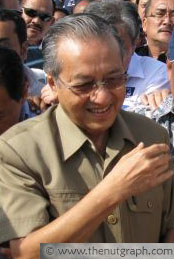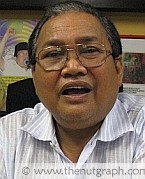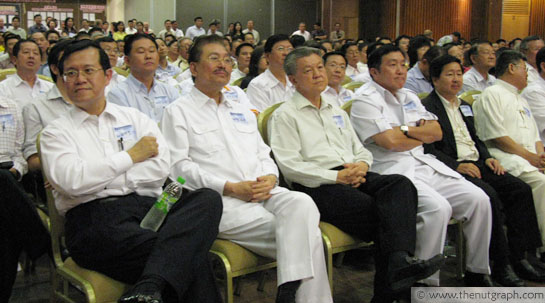By Deborah Loh | The Nut Graph,  IN the first part of his interview with The Nut Graph, MCA president Datuk Seri Dr Chua Soi Lek spoke about the need for the MCA to be more assertive in voicing the concerns of Chinese Malaysians. But the things the MCA supports – a secular state, a liberalised economy – puts it at odds with segments of Umno, the leader of the Barisan Nasional (BN) coalition, and with right-wing Malay Malaysian groups like Perkasa.
IN the first part of his interview with The Nut Graph, MCA president Datuk Seri Dr Chua Soi Lek spoke about the need for the MCA to be more assertive in voicing the concerns of Chinese Malaysians. But the things the MCA supports – a secular state, a liberalised economy – puts it at odds with segments of Umno, the leader of the Barisan Nasional (BN) coalition, and with right-wing Malay Malaysian groups like Perkasa.
Chua talks about how he views this challenge in this second and final part of an interview with The Nut Graph conducted at Wisma MCA in Kuala Lumpur on 6 Sept 2010.
TNG: Following up from your speech at the MCA’s Chinese Economic Congress – if your suggestions and resolutions can make Malaysia competitive, what, then, is needed to make these things happen?
Chua Soi Lek: First, the political will to change. All political parties in the world are the same. After too long in power, complacency sets in, and there is often abuse of the system and corruption. So [political will is needed to change], and I believe that development in a multiracial country is not a zero-sum game. When there is economic growth, everybody will benefit.
But in any society there will be some who benefit more than others. So affirmative action is still required. It should be based on needs and merits. If these can be placed in order, then we can liberalise the various sectors. And I specifically mentioned oil and gas, and telecommunications. These are three big sectors that need to be liberalised to make the economy more competitive, and to attract foreign participation and local participation.
Did you have feedback that Chinese Malaysians involved in these three sectors are being disadvantaged?
No, I don’t have the figures. I’m not just talking about the Chinese, I’m talking about all communities in Malaysia. Oil and gas are monopolised by Petronas. Telecommunications is monopolised by a few big players, foreign and local. So we need to open up.
Is there strong enough Malay leadership to push this through?
To be fair, I think [Datuk Seri] Najib [Razak] has that quality. He is a good listener, he’s bright, he’s got a good memory, he’s committed and he’s fair. Now the question is political will to change.
His political will or that of Umno’s?
His and that of his colleagues within the party to respond to a changed political scenario after March 2008.
And if such political will is slow in coming, what should parties like yours and other BN components do?
That’s why we’ve become more vocal. We just want to make our views known.
Is Umno‘s leadership doing enough to distance the party from Perkasa?
 I think they are not doing enough. I’m very clear in my mind that [Perkasa] is not linked to Umno. But nobody can prevent [Tun Dr] Mahathir [Mohamad] from attending Perkasa functions. You know Mahathir – he chooses what he wants to do. But if he wants to be associated with Perkasa, there’s nothing you and I, or Najib, can do.
I think they are not doing enough. I’m very clear in my mind that [Perkasa] is not linked to Umno. But nobody can prevent [Tun Dr] Mahathir [Mohamad] from attending Perkasa functions. You know Mahathir – he chooses what he wants to do. But if he wants to be associated with Perkasa, there’s nothing you and I, or Najib, can do.
If Umno is unable to successfully distance itself from Perkasa, what are the consequences for national politics?
The Chinese [Malaysians] have to be very clear that there is no way we can create a small China in Malaysia. We all have to accept the fact that we live in this multiracial society, whether you like it or not.
And in order to make this work, no government in power would take away the privileges enjoyed by Malay [Malaysians] right now. No one. [Datuk Seri] Anwar [Ibrahim] has never really stood up to say he would reject Malay special privileges. Mana ada? And I don’t think DAP would dare to demand it either.
But the Chinese [Malaysians] are all hoping. The Chinese community’s expectation is that if Pakatan Rakyat comes to power, it will remove special privileges. I don’t think this will [happen]. But because [DAP] never said [that it will actually remove special privileges], the Chinese expect it. This is a case of “nothing said is better than said” by DAP. So what I’m telling the Chinese community is, we have to accept the political reality in this country that it will [always] be a balancing game. Balancing the needs of all the races.
 And part of this balancing game is for Umno to lend its ear to Perkasa?
And part of this balancing game is for Umno to lend its ear to Perkasa?
The balancing game is for Umno to take care of the Malays, to take care of the Chinese, Indians and other minorities. To me, Perkasa is the minority of the minority, you quote me on this please. Only the Chinese get very excited over Perkasa, and because [Perkasa] knows they excite the Chinese and the media, they’re getting a lot of attention. They will continue to speak so that they will have a platform of their own. And we are all walking into that trap. The best way to deal with them is to ignore them.
Doesn’t Umno employ the same tactic in rousing Malay Malaysian support? Because you’ve noted in your speech at the Kedah MCA convention on 6 Aug 2010 that Umno has become conservative in recent years to compete with PAS.
I won’t say that Umno is becoming like Perkasa, that’s not fair.
But you said they have become more conservative…
Conservative in the sense that they become more religiously sensitive so that PAS cannot be seen as [having] the exclusive monopoly on Islam.
If Umno’s religious conservatism continues, what’s the consequences of that for component parties and national politics?
We must learn to co-exist. Umno’s religious conservatism will never, never be on par with PAS.
You say the public shouldn’t give the Pakatan Rakyat a chance to form the federal government as they would continue bickering over hudud law. But what about the fact that the BN in Terengganu has not done anything to remove hudud law that the PAS state government approved in 2002? Shouldn’t this be something that the MCA should push for, for the sake of consistency?
No. I won’t be pushing … You cannot implement hudud law at state level until you amend the Federal Constitution. So why are you pushing something which is a no-go? I’m very focused. I won’t want to waste time on something that’s a no-go. And MCA would definitely object to any implementation of the hudud law, simple as that.
Are you personally for a secular state?
This is definitely a secular state as provided for in the constitution.
That would be a contrarian view to some conservatives in Umno who want an Islamic state as well. Since the MCA is Umno’s colleague in the BN, how can you then convince Chinese Malaysian voters to support MCA-BN?
The Chinese do not understand the difference between an Islamic state propounded by PAS with hudud law, and what [we have now as] a secular state. We insist that [this] is a secular state. [There's no need to] talk every day about Mahathir‘s pronouncement. We should not be carrying the baggage of what our previous leaders have said.
 The simplest message [for the Chinese Malaysian] is, [look at] what you have now. Can you survive in an environment where every level is being Islamised with Islamic values? [Where there will be] stress on Islamic education, Islamic values, Islamic law, a hudud system? Can the Chinese adapt themselves to an environment like that, compared to what we have right now?
The simplest message [for the Chinese Malaysian] is, [look at] what you have now. Can you survive in an environment where every level is being Islamised with Islamic values? [Where there will be] stress on Islamic education, Islamic values, Islamic law, a hudud system? Can the Chinese adapt themselves to an environment like that, compared to what we have right now?
Some would say that Islamisation is already happening right now. For example, some parents complain that it is happening in schools.
No, that’s not true. Islam is the official religion. [It's] whether the Chinese can accept what they have now, compared to what they will have if PAS comes to power. [If Pakatan Rakyat] comes to power, DAP, because of the system of cabinet and the numbers game, will not be able to check PAS. DAP will be powerless. Because in this country, it’s the prime minister who calls the shots.
With Malaysia Day coming, and to close this interview, what’s the way forward for Malaysia?
The way forward is that we must know how to co-exist in a multiracial country. Without harmony, whatever great programme there is will come to nothing. Any party that wants to come to power in this country must know how to manage the complexity of managing a diverse population, and that’s not an easy thing.

(Pic courtesy of MCA)
Chua talks about how he views this challenge in this second and final part of an interview with The Nut Graph conducted at Wisma MCA in Kuala Lumpur on 6 Sept 2010.
TNG: Following up from your speech at the MCA’s Chinese Economic Congress – if your suggestions and resolutions can make Malaysia competitive, what, then, is needed to make these things happen?
Chua Soi Lek: First, the political will to change. All political parties in the world are the same. After too long in power, complacency sets in, and there is often abuse of the system and corruption. So [political will is needed to change], and I believe that development in a multiracial country is not a zero-sum game. When there is economic growth, everybody will benefit.
But in any society there will be some who benefit more than others. So affirmative action is still required. It should be based on needs and merits. If these can be placed in order, then we can liberalise the various sectors. And I specifically mentioned oil and gas, and telecommunications. These are three big sectors that need to be liberalised to make the economy more competitive, and to attract foreign participation and local participation.
Did you have feedback that Chinese Malaysians involved in these three sectors are being disadvantaged?
No, I don’t have the figures. I’m not just talking about the Chinese, I’m talking about all communities in Malaysia. Oil and gas are monopolised by Petronas. Telecommunications is monopolised by a few big players, foreign and local. So we need to open up.
Is there strong enough Malay leadership to push this through?
To be fair, I think [Datuk Seri] Najib [Razak] has that quality. He is a good listener, he’s bright, he’s got a good memory, he’s committed and he’s fair. Now the question is political will to change.
His political will or that of Umno’s?
His and that of his colleagues within the party to respond to a changed political scenario after March 2008.
And if such political will is slow in coming, what should parties like yours and other BN components do?
That’s why we’ve become more vocal. We just want to make our views known.
Is Umno‘s leadership doing enough to distance the party from Perkasa?

Mahathir
If Umno is unable to successfully distance itself from Perkasa, what are the consequences for national politics?
The Chinese [Malaysians] have to be very clear that there is no way we can create a small China in Malaysia. We all have to accept the fact that we live in this multiracial society, whether you like it or not.
And in order to make this work, no government in power would take away the privileges enjoyed by Malay [Malaysians] right now. No one. [Datuk Seri] Anwar [Ibrahim] has never really stood up to say he would reject Malay special privileges. Mana ada? And I don’t think DAP would dare to demand it either.
But the Chinese [Malaysians] are all hoping. The Chinese community’s expectation is that if Pakatan Rakyat comes to power, it will remove special privileges. I don’t think this will [happen]. But because [DAP] never said [that it will actually remove special privileges], the Chinese expect it. This is a case of “nothing said is better than said” by DAP. So what I’m telling the Chinese community is, we have to accept the political reality in this country that it will [always] be a balancing game. Balancing the needs of all the races.

Perkasa president Datuk Ibrahim Ali
The balancing game is for Umno to take care of the Malays, to take care of the Chinese, Indians and other minorities. To me, Perkasa is the minority of the minority, you quote me on this please. Only the Chinese get very excited over Perkasa, and because [Perkasa] knows they excite the Chinese and the media, they’re getting a lot of attention. They will continue to speak so that they will have a platform of their own. And we are all walking into that trap. The best way to deal with them is to ignore them.
Doesn’t Umno employ the same tactic in rousing Malay Malaysian support? Because you’ve noted in your speech at the Kedah MCA convention on 6 Aug 2010 that Umno has become conservative in recent years to compete with PAS.
I won’t say that Umno is becoming like Perkasa, that’s not fair.
But you said they have become more conservative…
Conservative in the sense that they become more religiously sensitive so that PAS cannot be seen as [having] the exclusive monopoly on Islam.
If Umno’s religious conservatism continues, what’s the consequences of that for component parties and national politics?
We must learn to co-exist. Umno’s religious conservatism will never, never be on par with PAS.
You say the public shouldn’t give the Pakatan Rakyat a chance to form the federal government as they would continue bickering over hudud law. But what about the fact that the BN in Terengganu has not done anything to remove hudud law that the PAS state government approved in 2002? Shouldn’t this be something that the MCA should push for, for the sake of consistency?
No. I won’t be pushing … You cannot implement hudud law at state level until you amend the Federal Constitution. So why are you pushing something which is a no-go? I’m very focused. I won’t want to waste time on something that’s a no-go. And MCA would definitely object to any implementation of the hudud law, simple as that.
Are you personally for a secular state?
This is definitely a secular state as provided for in the constitution.
That would be a contrarian view to some conservatives in Umno who want an Islamic state as well. Since the MCA is Umno’s colleague in the BN, how can you then convince Chinese Malaysian voters to support MCA-BN?
The Chinese do not understand the difference between an Islamic state propounded by PAS with hudud law, and what [we have now as] a secular state. We insist that [this] is a secular state. [There's no need to] talk every day about Mahathir‘s pronouncement. We should not be carrying the baggage of what our previous leaders have said.

Chua among MCA delegates in 2008
Some would say that Islamisation is already happening right now. For example, some parents complain that it is happening in schools.
No, that’s not true. Islam is the official religion. [It's] whether the Chinese can accept what they have now, compared to what they will have if PAS comes to power. [If Pakatan Rakyat] comes to power, DAP, because of the system of cabinet and the numbers game, will not be able to check PAS. DAP will be powerless. Because in this country, it’s the prime minister who calls the shots.
With Malaysia Day coming, and to close this interview, what’s the way forward for Malaysia?
The way forward is that we must know how to co-exist in a multiracial country. Without harmony, whatever great programme there is will come to nothing. Any party that wants to come to power in this country must know how to manage the complexity of managing a diverse population, and that’s not an easy thing.

No comments:
Post a Comment